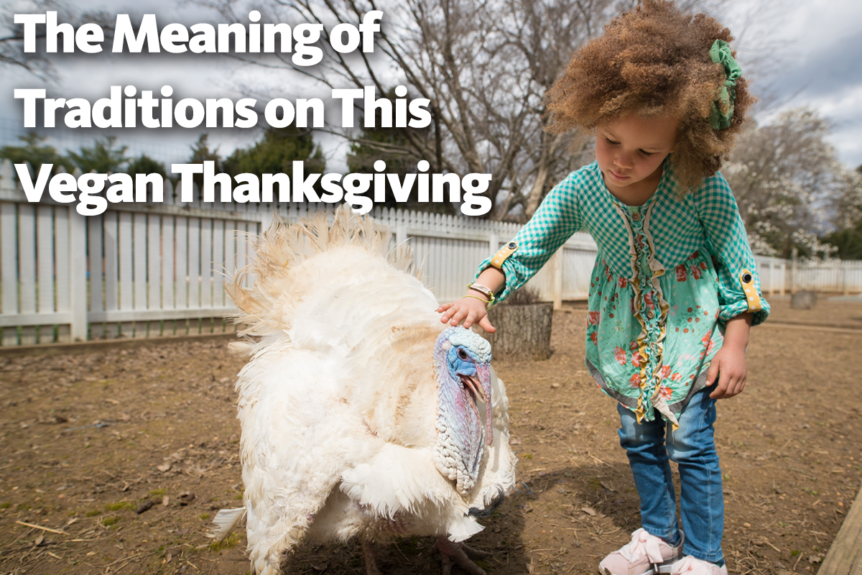My eight-year-old came home last week with a reading passage on Thanksgiving and the meaning of traditions as part of his homework. As many third-grade assignments do, it was written in a way meant to dictate a certain set of principles and ask the children to “make an inference” about them – in this case, on the meaning of certain traditions the story’s characters had for Thanksgiving.
He brought it to me for help because the inference was pretty tightly controlled along a certain set of presuppositions about what was normal and meaningful about the holiday. Since he doesn’t share some of the specific traditions in the story – having grown up vegan and therefore not eating turkey for Thanksgiving – he was confused. First, he couldn’t understand why they used the word “carve” for the turkey. Once I explained, he thought “cutting” or “slicing” would have been much clearer. As a person who came into vegan eating after a meat-eating childhood, it hadn’t occurred to me to think of the word “carving” as unnecessarily fanciful, nothing more than an affectation. Now I can’t not see it that way.
A brief history of Thanksgiving traditions
I did a bit of internet sleuthing on the tradition of “carving” the turkey and the first thing I found literally is an article called “Why The Man Should Carve The Meat.” According to the article, a man should take on the carving of the meat on Thanksgiving because it “asserts you as the head of the house,” since, after all, “your wife or girlfriend have done the most preparation,” and this “satisfies your mental caveman” and “because that’s what men do.” I wish I was joking. Sigh.
Things got even more absurd when my son came upon the section in his reading passage about the wishbone tradition. The tradition itself is not described in the reading passage – I understood why once I tried explaining it to him. I had one of those moments where I hear the words coming out of my mouth and realize how utterly bizarre it is to say things like “they reach into the carcass and pull out this bone and each person holds one end” as I watch him stare at me like I have three heads. I continued, “and then they snap the bone and whoever gets the biggest part is the winner and gets their wish granted.” I felt compelled to respond to his facial expression of disbelief and disgust by finishing up with “gross, I know.”
A bit of research tells me this one originates in 800 BC with the Etruscans who used chickens as oracles to predict the future and after they killed the chicken, they left the wishbone on the ground for people to touch and use its oracle power after death. That percolated its way through a couple of other societies until the current iteration of using it for turkey wishbones started in 1842 with a Baltimore Sun article. The website where I learned this is literally called Grateful. I couldn’t make this stuff up.
The symbolism of Thanksgiving
Of course, these are not the only traditions people have rightly taken issue with at Thanksgiving, whether related to eating a turkey or not. The symbolism of Thanksgiving makes it a powerful target for politically-motivated mythmaking with less regard to the actual history of the holiday.
Here’s the thing: none of us are required to go along with any given tradition whose roots or symbolism – or in the case of turkey-eating, direct harm – we don’t agree with.
Connecting traditions to your values
When people point this out, the counterargument is that this is an attack on traditions, which can end the conversation in a stalemate. But I don’t think that’s right. We are free to both want to celebrate a holiday and its traditions and do it in a way that puts us in the position of power to choose which of those traditions to carry forward and how to connect those things with our values and the meaning we take from the holiday. It’s okay to inquire into the traditions, to cherry-pick and to customize them so they fit the most meaningful things each of us wants to get from the holiday and to bring that value to the celebration with our friends and family. All of us have a part to play, and agency here.
What this means for my family and friends
What this means for my family and friends: of course, we have a vegan Thanksgiving because of the animals. There are certain dishes from my childhood that mean Thanksgiving to me, some of which I veganized and some of which were already vegan. Corn is a Thanksgiving food and non-Midwesterners will not convince me otherwise. The concept and practice of gratitude is also a tradition we’re happy to keep, and I notice it helps the kids a lot with some of the normal stressors of childhood during the rest of the year too. Perhaps my favorite thing to do, though, is to talk about what turkeys are really like. When they are not trapped in the system of animal agriculture to be made into meat, turkeys can be very affectionate and fascinating animals.
I visited a sanctuary and was utterly charmed by a turkey who came up to me for attention and let me pet his scaly dinosaur-like head. He slowly closed his eyes and made a sound I can only describe as a cross between cooing and purring. It was unmistakably a happy turkey noise. At the same sanctuary, I attended a wedding years later. The turkeys visited the reception and stood by the dinner tables begging guests for food, exactly like feathery golden retrievers.
Wherever you are having Thanksgiving, and whether you are vegan or not, everyone can be part of intentional tradition-making. If you are hosting a meal, consider ways to accommodate and be a vegan ally this Thanksgiving.
[simple-author-box]
